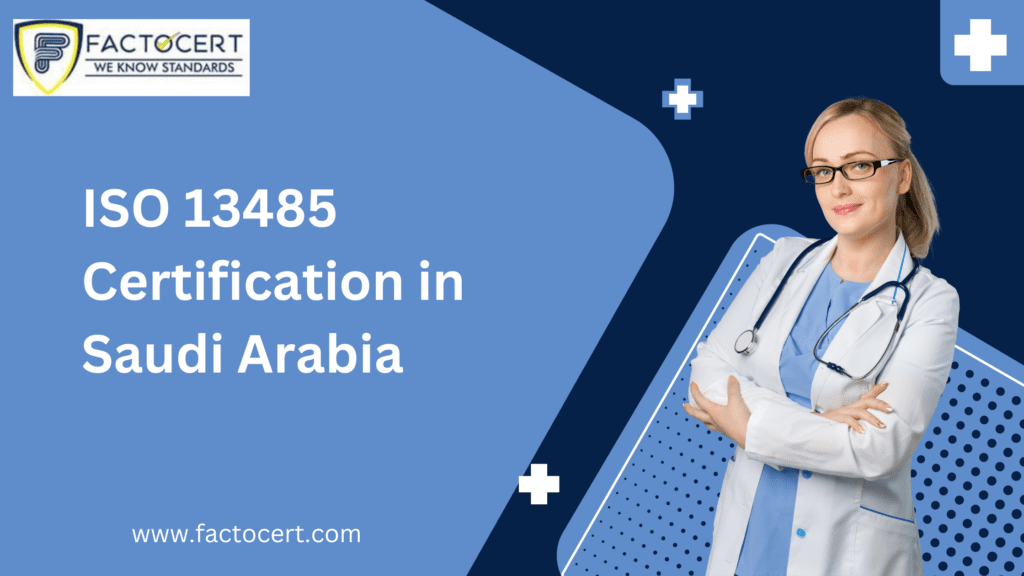ISO 13485 Certification in Saudi Arabia for ever-changing healthcare business, it is crucial to comply with international standards to guarantee the safety and quality of medical devices. The ISO 13485 standard, widely acknowledged worldwide, is a quality management system specifically tailored for medical devices. It is important for enterprises in Saudi Arabia’s rapidly growing healthcare industry. This blog will explore the essential criteria organisations need to fulfil to acquire ISO 13485 Certification in Saudi Arabia.
Understanding ISO 13485 Certification
ISO 13485 Certification in Saudi Arabia is a globally acknowledged standard that specifies the criteria for a quality management system (QMS) in the design, development, manufacture, and distribution of medical devices. The primary focus is on adhering to regulatory standards, guaranteeing client contentment, and upholding efficient procedures throughout the product’s lifespan.
Essential Criteria for Obtaining ISO 13485 Certification in Saudi Arabia.
Management dedication and guidance:
The dedication of senior executives to quality is essential. This entails the establishment of a quality policy, ensuring its congruence with organisational objectives, and actively implementing the Quality Management System (QMS).
Officially recorded Quality Management System:
Create and manage a thorough QMS documentation, encompassing the quality manual, procedures, and work instructions. The documentation should provide a comprehensive and explicit description of the procedures and measures that have been put in place inside the organisation.
Management of resources:
Optimal distribution of resources, encompassing staff, infrastructure, and training, guarantees the efficient Quality Management System (QMS) operation. Additionally, this entails designating a management representative accountable for supervising the Quality Management System (QMS).
Product realisation refers to bringing a product from concept to completion.
Emphasising the strategic management and oversight of procedures pertaining to product implementation. This encompasses the entire process, from design and development to purchasing, production, and service provision, with a strong focus on satisfying customer and regulatory demands.
Assessment, Examination, and Enhancement:
Implementing procedures to oversee and evaluate critical elements of the Quality Management System. This entails internal audits, overseeing customer satisfaction, and adopting corrective and preventive measures to enhance the system consistently.
Process Validation:
Ensuring the validation of procedures to showcase their efficacy and uniformity. This includes the verification of production and service-providing procedures and the procedures for monitoring and measuring.
Adherence to regulations:
Complying with the regulatory standards applicable to the medical devices sector in Saudi Arabia. This entails remaining knowledgeable about regulatory revisions and ensuring that the Quality Management System (QMS) adheres to these standards.
Hazard Mitigation:
Establishing a comprehensive risk management procedure to systematically recognise, evaluate, and alleviate potential risks linked to the manufacturing and dissemination of medical devices. Ensuring the safety and effectiveness of the devices is crucial.
Management of suppliers:
Developing and sustaining procedures for the identification and oversight of vendors. This entails verifying that suppliers adhere to stated criteria and contribute to the overall efficiency of the Quality Management System (QMS).
Documentation:
Ensuring thorough documentation to prove compliance with standards and the efficient functioning of the Quality Management System (QMS). This encompasses documentation of management evaluations, internal inspections, and measures to address and prevent issues.
The Advantages of ISO 13485 Certification in Saudi Arabia
Acquiring ISO 13485 Certification in Saudi Arabia provides medical device companies many benefits. First and foremost, it boosts the organisation’s legitimacy, fostering trust among consumers and stakeholders. Moreover, it enhances market entry by showcasing adherence to global benchmarks, thus unlocking worldwide prospects.
Why choose Factocert for ISO 13485 Certification in Saudi Arabia?
Factocert is a well-known ISO 13485 Certification Bodies in Saudi Arabia.Providing ISO 13485 Consultants in Saudi Arabia and major cities in Riyadh, Jeddah, Dammam, Al Khobar, Dhahran, Buraidah, Al-Ahsa, Qatif, and Jubail, among other places. Visit www.factocert.com or send an email to contact@factocert.com to find out more
Conclusion
Obtaining ISO 13485 Certification in Saudi Arabia is a prudent decision for enterprises functioning within the medical devices industry. By comprehending and satisfying the essential prerequisites delineated by this globally acknowledged standard, organisations can not only guarantee adherence to regulatory expectations but also enhance their dedication to quality and patient safety. ISO 13485 Certification demonstrates a company’s commitment to providing secure and efficient medical devices in the Saudi Arabian market and beyond, as the healthcare industry progresses.
For More information visit : ISO 13485 Certification in Saudi Arabia





